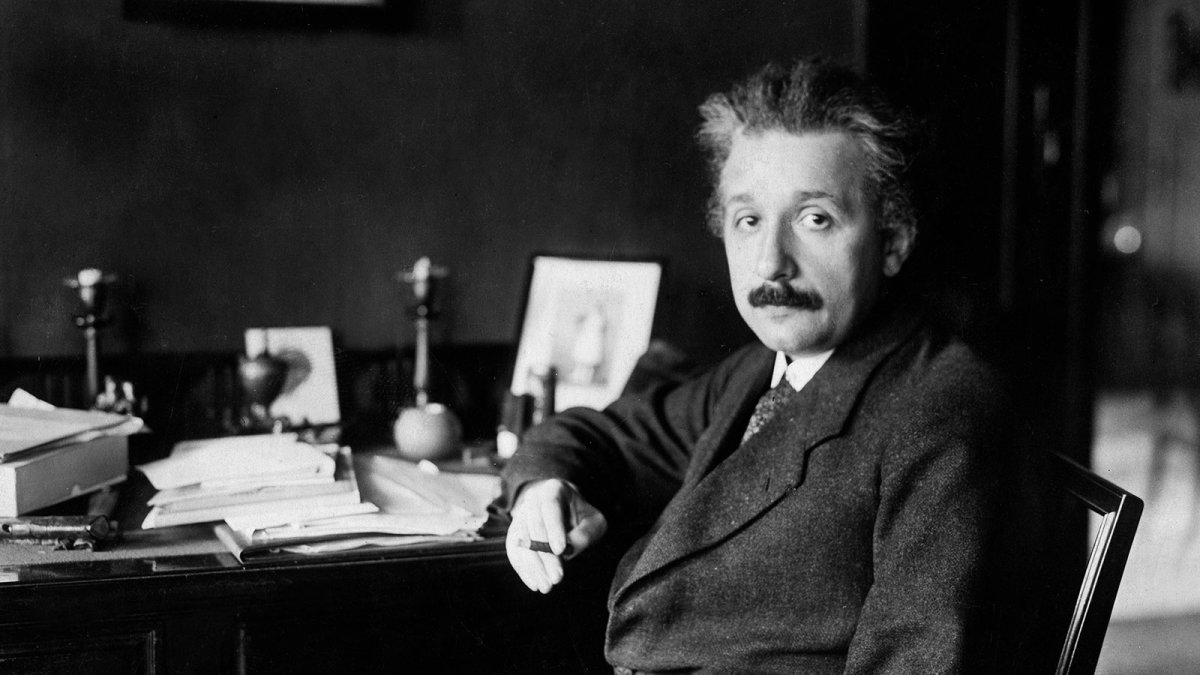
不論是在現實生活中遇見的基督徒(不管是在中國內地,香港,還是新西蘭),抑或是在電視訪問中見到的基督徒,還是在網絡上見到的基督徒的文章、博客、論壇,等等,我都見到過愛因斯坦被基督徒拿出來舉證相信基督教的傑出科學家,在一些文章的段落或者是評論之中,我們還能夠經常看到對於他討論“上帝”的只言片語的引用。這背後的邏輯很容易理解,如果被公認為人類歷史上最聰明的、功勳卓絕的科學家都信基督教的話,那麼那些才智平庸的無神論者們還有什麼理由拒絕接受上帝呢?甚至於我還見過身邊的無神論朋友也相信這個說法,並且其中有些人曾經用愛因斯坦的案例來證明相信基督教是理性的。從基督徒的角度講,把愛因斯坦拉入自己的陣營,還有另外一個戰略意義。在基督教界與無神論界存在著一場曠日持久的論戰:科學與宗教究竟是否相互衝突?理性主義者與無神論者的立場,當然是認為兩者之間是有著巨大衝突的;基督徒們則站在對立的立場,而營造“愛因斯坦信基督教”這樣一個印象,將有助於基督徒為自己的觀點辯護。簡言之,愛因斯坦這個形象成為了輿論戰中的一個被消費的符號。
序幕:“上帝之書”
2008 年,在英國布倫斯拍賣行(Bloomsbury Auctions),有人以 40 萬 4 千美元的高價競拍下愛因斯坦的一封討論上帝的書信原件,這封信在當時被媒體包裝為“愛因斯坦的上帝之書” (Einstein’s God letter)。當時的競拍者行列,還包括有著名的無神論界的精神領袖: Richard Dawkins,這封信每次現世對於無神論界和基督教世界來說都是一個重大事件。拍賣行也大肆宣傳,鼓吹這封書信終於令愛因斯坦的宗教立場真相大白。2018 年,當初的買主又將這封信委託給紐約佳士得拍賣行(Christie’s)公開拍賣,最終被以將近 290 萬美元的價格競拍。
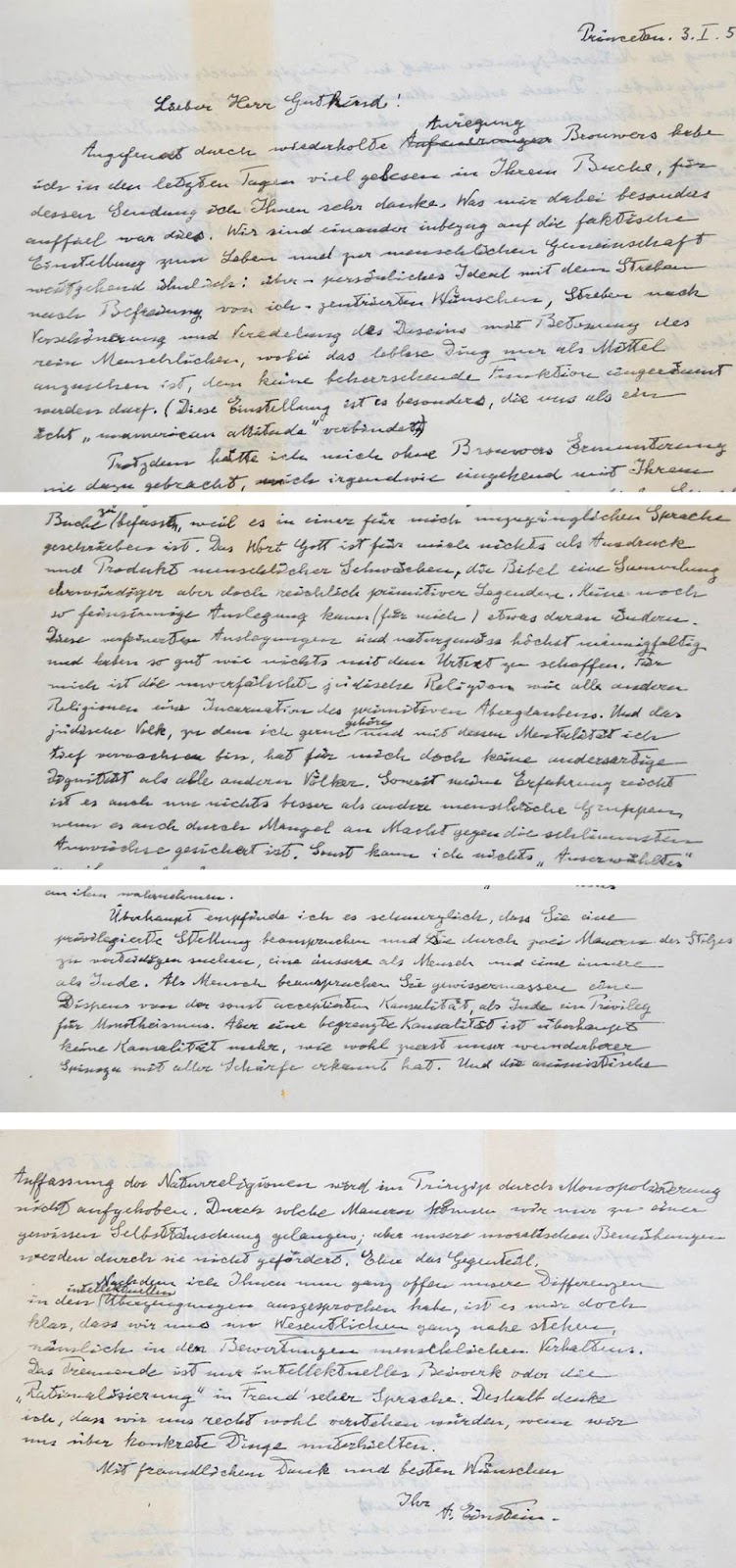 (這封書信是以德文書寫)
(這封書信是以德文書寫)
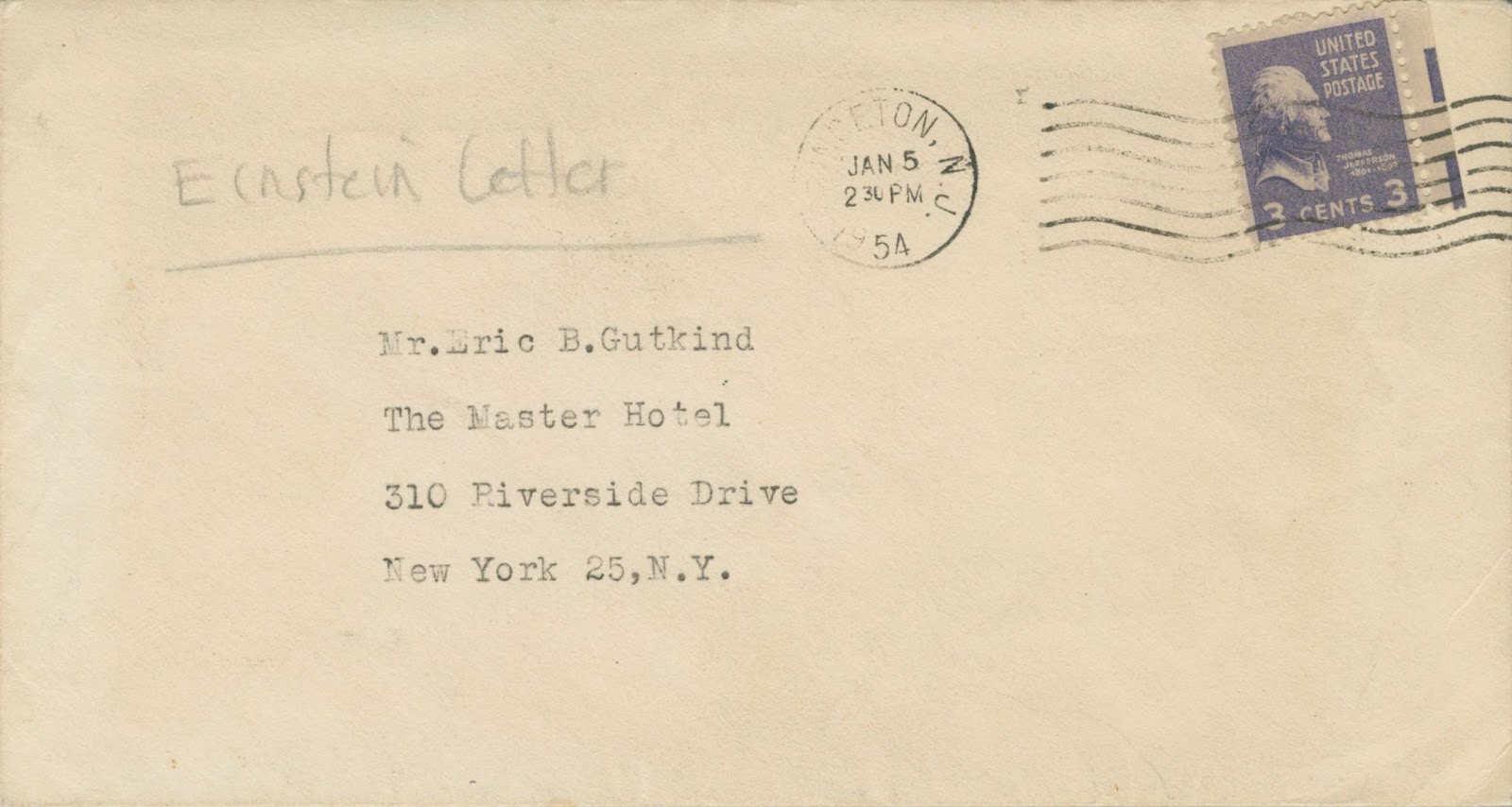
這封信的歷史背景是什麼呢?
在同事的建議下,愛因斯坦閱讀了德國猶太哲學家 Eric Gutkind 在 1952 年出版的一部著作,《Choose Life: The Biblical Call to Revolt》,其討論的內容是猶太教給猶太人的啟示與現代世界之間的關係。作為對於這本書的回應,在 1954 年 1 月 3 日,愛因斯坦寫了這封信給 Gutkind。
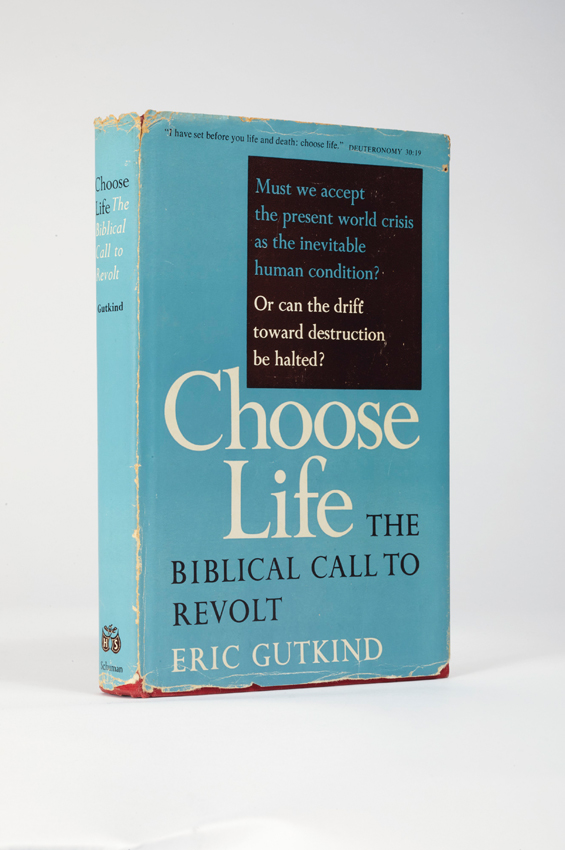
而關於上帝,這封信到底又說了什麼呢?其中有如下一段:
… The word God is for me nothing more than the expression and product of human weaknesses, the Bible a collection of honorable, but still primitive legends which are nevertheless pretty childish. No interpretation no matter how subtle can (for me) change this. These subtilised interpretations are highly manifold according to their nature and have almost nothing to do with the original text. For me the Jewish religion like all other religions is an incarnation of the most childish superstitions…
他表示:“上帝”這個概念僅僅是人類的弱小導致的一個產物,《聖經》的故事固然值得敬佩,但終歸是一些幼稚又原始的傳說,對經文再怎樣微妙精巧的解讀,也不會令他轉變想法,對《聖經》的不同解讀有成千上萬,但是卻都與原文幾乎沒有關聯,對他而言,猶太教和所有其他宗教一樣,是最幼稚的迷信的再現。另外,順便值得一提的是,對於猶太人自詡的“被上帝選中的子民”這個身份,愛因斯坦的評價如下:
And the Jewish people to whom I gladly belong and with whose mentality I have a deep affinity have no different quality for me than all other people. As far as my experience goes, they are also no better than other human groups, although they are protected from the worst cancers by a lack of power. Otherwise I cannot see anything ‘chosen’ about them.
即他不認為與其他種族相比,猶太人有什麼特別的優越之處,他覺得猶太人和所有的種族一樣,而且並不是“被選中”的特殊種族。Gutkind 的這本書我並沒有讀過,但是其中有如下段落:
The soul of the Jewish people was never a mass-soul. Israel’s soul could not be hypnotized; it never succumbed to hypnotic assaults. … The soul of Israel is incorruptible
可見 Gutkind 作為一個猶太人,對於自身民族所持有的這樣種態度,非常接近依然堅持信仰傳統猶太教的猶太群體所特有的一種病態的自戀,Gutkind 認為猶太人的這種格格不入是一種道骨仙風,這個結論幾乎完全不去考慮在歐洲持續了將近 2000 年的反閃米特主義帶來的導致猶太人被邊緣化的影響。而且,一個無條件地接納《聖經》內容為事實的人究竟還算不算是哲學家,這也是一個問題。但不管怎樣,愛因斯坦對他的觀點是持否定態度的。
愛因斯坦在完成這封信後大概一年左右與世長辭,Gutkind 的後裔也便將這封信雪藏了起來(其動機是個值得討論的話題),直到 2008 年它再次現世,所以即便是像 Max Jammer 和 Walter Isaacson 這樣的研究愛因斯坦生平的傳記作者在此之前也未曾聽説過這封書信。這封信的內容固然清楚地表達了愛因斯坦對於猶太-基督教中的上帝的態度,但是,假設沒有這封信出現,我們就真的無法知道愛因斯坦的立場嗎?當然不是!這其實僅僅是拍賣行的炒作而已。
愛因斯坦到底信不信基督教的上帝?
前言
實際上和多數偉大的科學家一樣,愛因斯坦所思考的範疇也不僅僅侷限於他所從事的理論物理學,從年輕時期開始,他的思考就已經進入到哲學高度,但在青年和中年時期,他身處在一個政治和宗教局勢都很複雜的世界,再加上他的猶太人身份,所以在多數情況下,對於宗教信仰這個話題,他傾向於保持沉默,並不會公然地表達自己的立場,不過在一些私人場合,他還是清晰地道出了自己的想法。
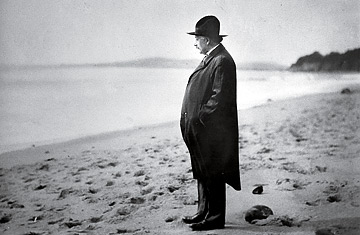
在 50 歲之後,一方面由於時過境遷,一方面他的內心也發生了微妙的變化,他開始清清楚楚,並且一再重複地講述他的世界觀到底為何。他生前在很多雜誌上發表過文章,討論他對於各種社會問題的看法,包括政治、教育、戰爭和心理健康等等,從這些文章都可以看得出他深切與真摯的人文關懷。不僅如此,愛因斯坦不僅不是一個故弄玄虛的人,甚至他其實還經常討論宗教問題,我們下面就來浮光掠影般地回顧一下他自己的文字。
對銀行家的回應
1927 年 8 月 5 日,一位來自科羅拉多州的銀行家,名為 M. Schayer 致信給身在柏林的愛因斯坦詢問他的宗教立場。Schayer 在信中詳細道明了事情的原委,他所參加的一個文學小組內部產生了一個關於宗教以及上帝存在與否的討論,最終這個小組成員共同決定就該問題質詢世界優秀的科學家們的看法,他在信中還提到,目前已經有 24 位獲得諾貝爾獎的科學家回應了他的問題,而且他得到的結論是大多數傑出的科學家都拒絕接受上帝是一個白髮蒼蒼、慈祥和藹、並被天使環繞的老者形象,他希望愛因斯坦也能回答他的詢問。
愛因斯坦的回信中包含如下內容(不過這封信到底有沒有寄出,卻並不確定):
I cannot conceive of a personal God who would directly influence the actions of individuals or would sit in judgment on creatures of his own creation …… My religiosity consists of a humble admiration of the infinitely superior spirit that reveals itself in the little that we can comprehend about the knowable world. That deeply emotional conviction of the presence of a superior reasoning power, which is revealed in the incomprehensible universe, forms my idea of God.
從這封信的內容可以看出愛因斯坦依然在否定一個人格化的神。同時他也給出了他心中的“上帝”的描述,這個部分我在後篇再另作討論。這封信的內容被收錄在下面這本書中。
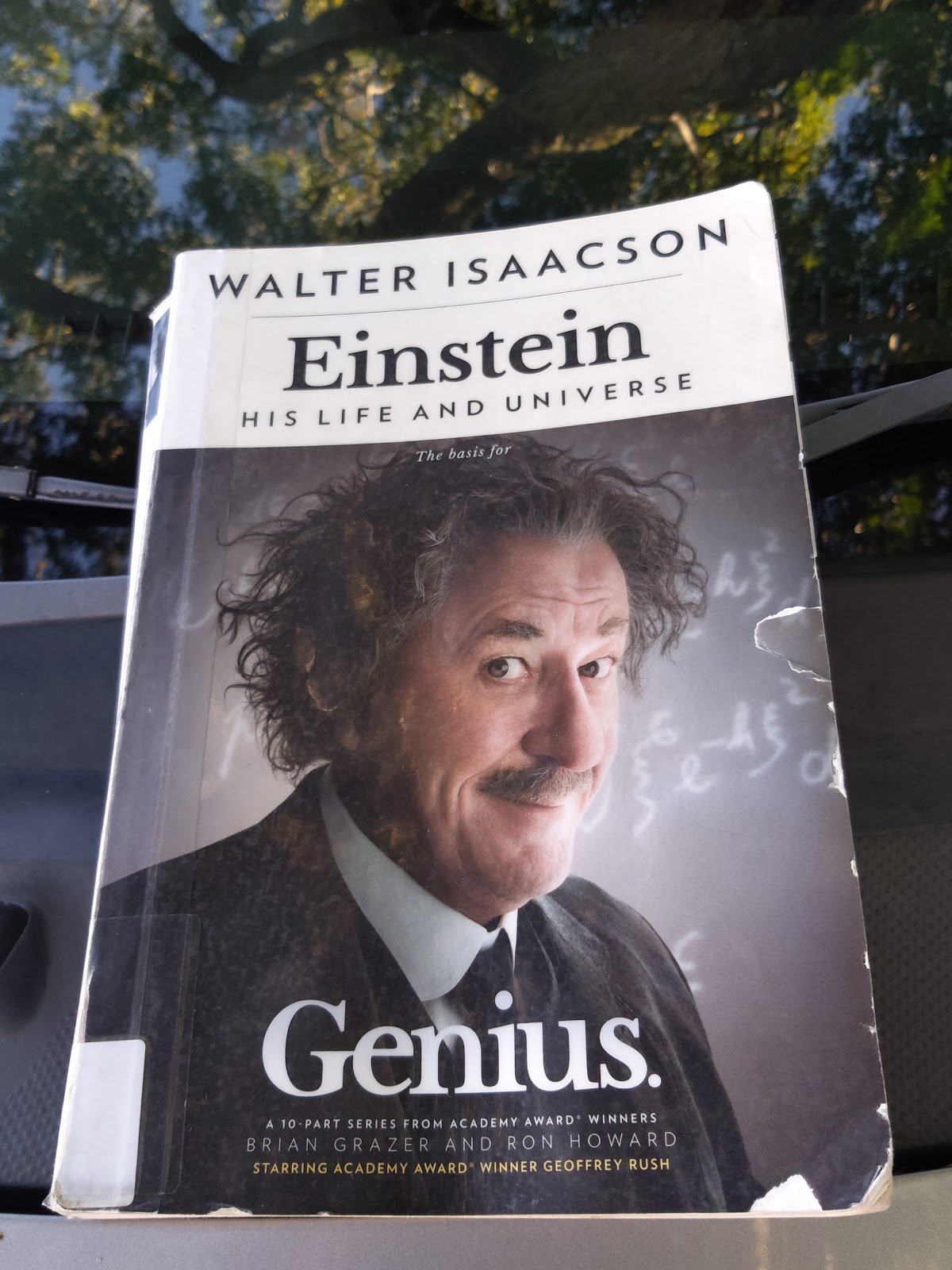
發表《宗教與科學》
1930 年,愛因斯坦在《紐約時報》(1930 年 11 月 9 號刊)發表了一篇題為《RELIGION AND SCIENCE》的文章,來介紹他對宗教和科學的觀點。
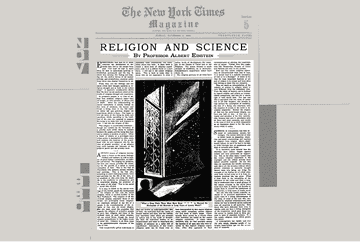
在這篇文章裡,愛因斯坦完全跳出理論物理學家的身份,從人類學、歷史學、心理學以及社會學的角度分析了宗教現象的產生。他劃分了三種宗教背後的心理動因,分別是:
- 恐懼;
- 道德支柱與精神扶持;
- 天人相應。
關於以恐懼為心理驅動力而發展的宗教,他更進一步指出,這種恐懼的來源是對於自然界的因果關係的無知,他說:
A little consideration will suffice to show us that the most varying emotions preside over the birth of religious thought and experience. With primitive man it is above all fear that evokes religious notions - fear of hunger,wild beasts, sickness, death. Since at this stage of existence understanding of causal connections is usually poorly developed, the human mind creates illusory beings more or less analogous to itself on whose wills and actions these fearful happenings depend.
關於以尋求道德與社會秩序為心理驅動力而發展的宗教,他說:
The desire for guidance, love, and support prompts mento form the social or moral conception of God. This is the God of Providence, who protects, disposes,rewards, and punishes; the God who, according to the limits of the believer’s outlook, loves and cherishes the life of the tribe or of the human race, or even or life itself; the comforter in sorrow and unsatisfied longing;he who preserves the souls of the dead. This is the social or moral conception of God.
關於以天人相應、梵我合一為心理驅動力而出現的宗教(“天人相應”、“梵我合一”衹是我藉助東方的古老玄學概念對“cosmic religious feeling”做的一個意蘊性的翻譯,愛因斯坦的這個詞彙,目前我尚不知道比較貼切的中文譯法),他說:
But there is a third stage of religious experience which belongs to all of them, even though it is rarely found in a pure form: I shall call it cosmic religious feeling. It is very difficult to elucidate this feeling to anyone who is entirely without it, especially as there is no anthropomorphic conception of God corresponding to it……The individual feels …… the sublimity and marvelous order which reveal themselves both in nature and in the world of thought. Individual existence impresses him as a sort of prison and he wants to experience the universe as a single significant whole. The beginnings of cosmic religious feeling already appear at an early stage of development…… Buddhism …… contains a much stronger element of this.
The religious geniuses of all ages have been distinguished by this kind of religious feeling, which knows no dogma and no God conceived in man’s image; so that there can be no church whose central teachings are based on it. Hence it is precisely among the heretics of every age that we find men who were filled with this highest kind of religious feeling and were in many cases regarded by their contemporaries as atheists, sometimes also as saints. Looked at in this light, men like Democritus, Francis of Assisi, and Spinoza are closely akin to one another.
在愛因斯坦眼裡,這第三類型的宗教有如下特點:
- 它很難以純粹的形式存在;
- 它僅僅是基於一種心理感受,而後面會講到,這種感受,它源自於對宇宙法則本身的精緻、美妙、神奇以及神秘的感嘆與欣賞,所以愛因斯坦認為,祇有少數具有天賦的人在經歷了科學求索之後,才有可能達到這樣一種狀態;
- 這個形態的宗教不會再去創造擬人化的神;
- 這個形態的宗教不會去創造教義,並將其作為教條強加給其他人;
- 這個形態的宗教,不需要建造教堂。
另外愛因斯坦也指出,古希臘的德謨克利特和斯賓諾莎便屬於這種宗教的實踐者,而且具有這種宗教情懷的人在過去往往被指責為無神論者,關於斯賓諾莎的故事,我會在後篇介紹。
愛因斯坦認為這三種宗教形態分別反映了人類文明發展的不同階段,從成熟度的角度講,後者比前者更為高級,祇有前面兩類會去創造擬人化的神,而且他指出希伯來聖經和基督教的《新約》便留下了從第一類宗教躍升至第二類宗教的痕跡。目前人類的宗教都是這幾種類型的混合體。
The Jewish scriptures admirably illustrate the development from the religion of fear to moral religion, a development continued in the New Testament. The religions of all civilized peoples, especially the people of the Orient, are primarily moral religions. The development from a religion of fear to moral religion is a great step in people’s lives …… The truth is that all religions are a varying blend of both types ……
從他的口吻不難看出,第三類宗教便是愛因斯坦極力推崇的一種宗教形態,而它顯然與猶太-基督教有天壤之別,且水火不容。
這篇文章後來被收錄在以下兩本書中。
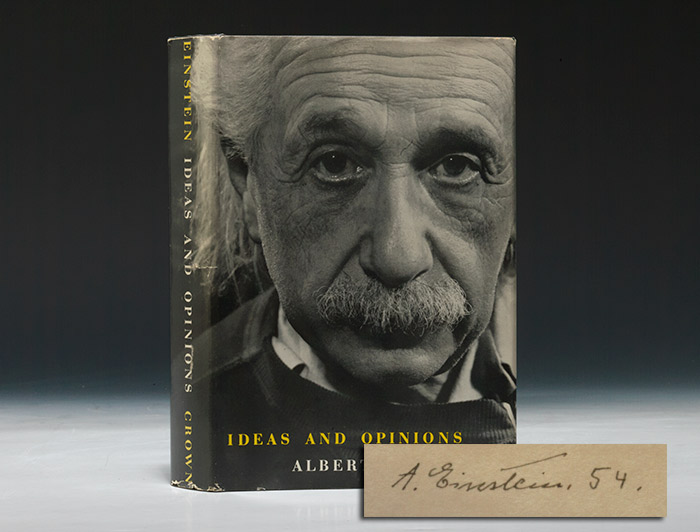 《Ideas and Opinions》,愛因斯坦文集,1954 年以英文出版。
《Ideas and Opinions》,愛因斯坦文集,1954 年以英文出版。
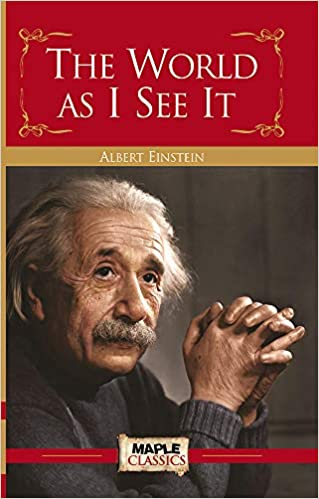
《The World as I See It》,1934 年以德文首次出版,次年由 A. Harris 翻譯成英文並由 The Bodley Head 出版社出版。
對基督徒小學生的回應
1936 年,紐約的一個 Sunday School 的六年級女學生,在其老師的鼓勵下,致信給愛因斯坦,在信中她問他一個問題:科學家們是否祈禱?(Do scientists pray?)既然是 Sunday school,可想而知這對師生必然是基督徒。那麼愛因斯坦是如何回答的呢?
一方面愛因斯坦斬釘截鐵地回答了科學家並不祈禱。
Scientific research is based on the idea that everything that takes place is determined by laws of nature, and therefore this holds for the actions of people. For this reason, a research scientist will hardly be inclined to believe that events could be influenced by a prayer, i.e. by a wish addressed to a supernatural being ……
但另一方面愛因斯坦卻又強調,對於宇宙法則進行深入的科學求索,會導致一個人相信有一個超越人類的、無所不能的、至高無上的存在。但這種信仰卻並不同於那些更幼稚的人們的宗教信仰,在這裡,那些“更幼稚的人”,指的又是誰呢?
However, it must be admitted that our actual knowledge of these laws is only imperfect and fragmentary, so that, actually, the belief in the existence of basic all-embracing laws in nature also rests on a sort of faith. All the same this faith has been largely justified so far by the success of scientific research. But, on the other hand, everyone who is seriously involved in the pursuit of science becomes convinced that a spirit is manifest in the laws of the universe—a spirit vastly superior to that of man, and one in the face of which we with our modest powers must feel humble. In this way the pursuit of science leads to a religious feeling of a special sort, which is indeed quite different from the religiosity of someone more naive……
這封信的內容被收錄在下面這本書中。
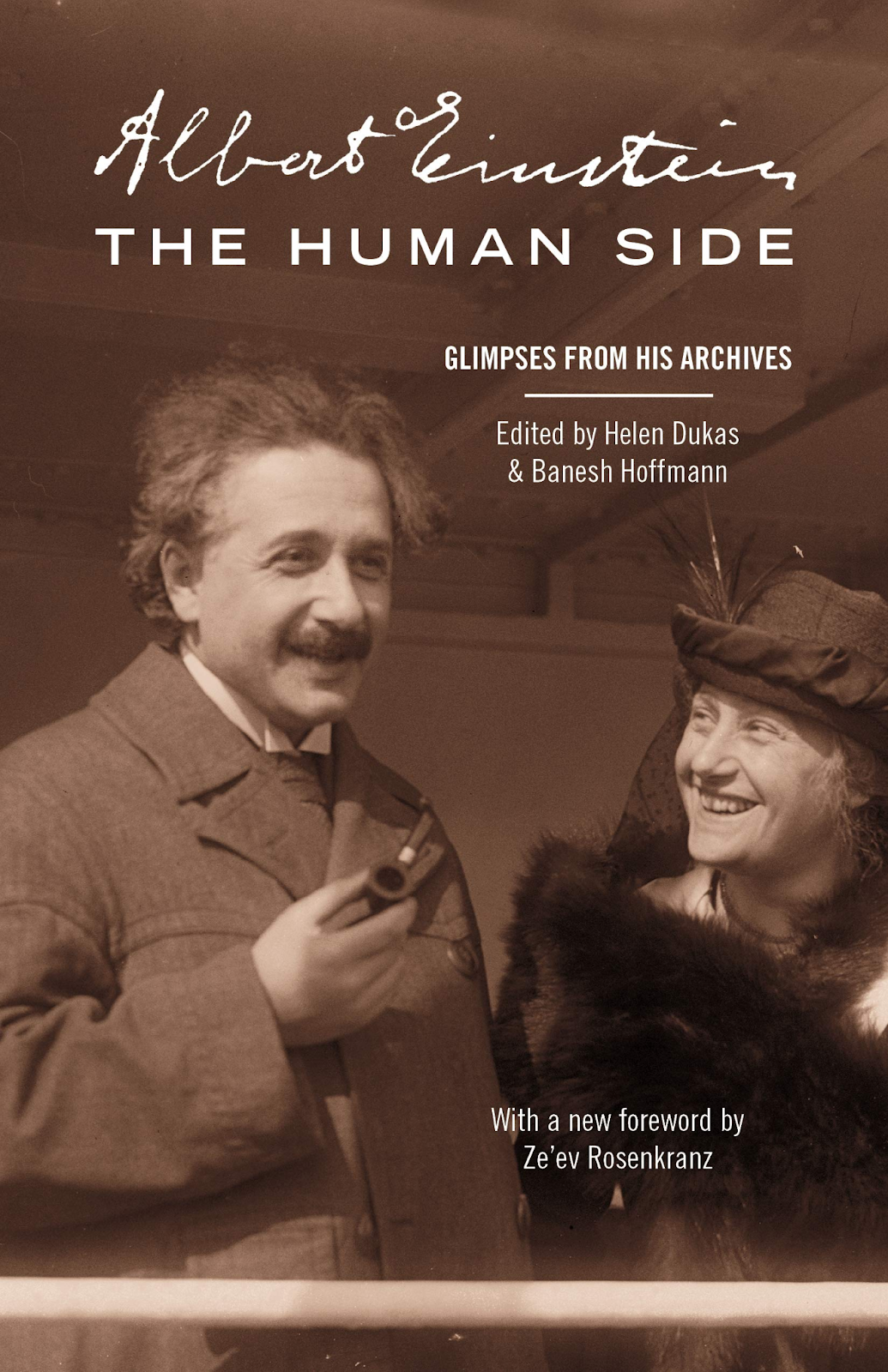
《Albert Einstein, The Human Side: Glimpses from His Archives》,由 Banesh Hoffmann 與 Helen Dukas 在 1972 年合作出版 。
與美國海軍少尉的書信
1945 年,在美國對日本使用原子彈前,愛因斯坦給一位美國海軍少尉 Guy H. Raner 的信中聲稱他是一個不可知論者(agnostic)。

愛因斯坦與 Raner 未曾謀面,後者首先寫信給愛因斯坦,他在信中稱他從傳聞中得知,有一個耶穌會(Jesuit, Society of Jesus,天主教會的一個很重要的男修會)牧師成功把愛因斯坦轉變成了天主教信徒,並希望愛因斯坦能澄清這件事是否屬實。
愛因斯坦對此的回應是:
From the viewpoint of a Jesuit priest I am, of course, and have always been an atheist. Your counter-arguments seem to me very correct and could hardly be better formulated. It is always misleading to use anthropomorphical concepts in dealing with things outside the human sphere - childish analogies ……
愛因斯坦在此明確聲明在耶穌會眼中他必然是一個無神論者,即表明他的世界觀與基督教並不相同,甚至相悖。他還表示一個擬人化的神的概念很幼稚。
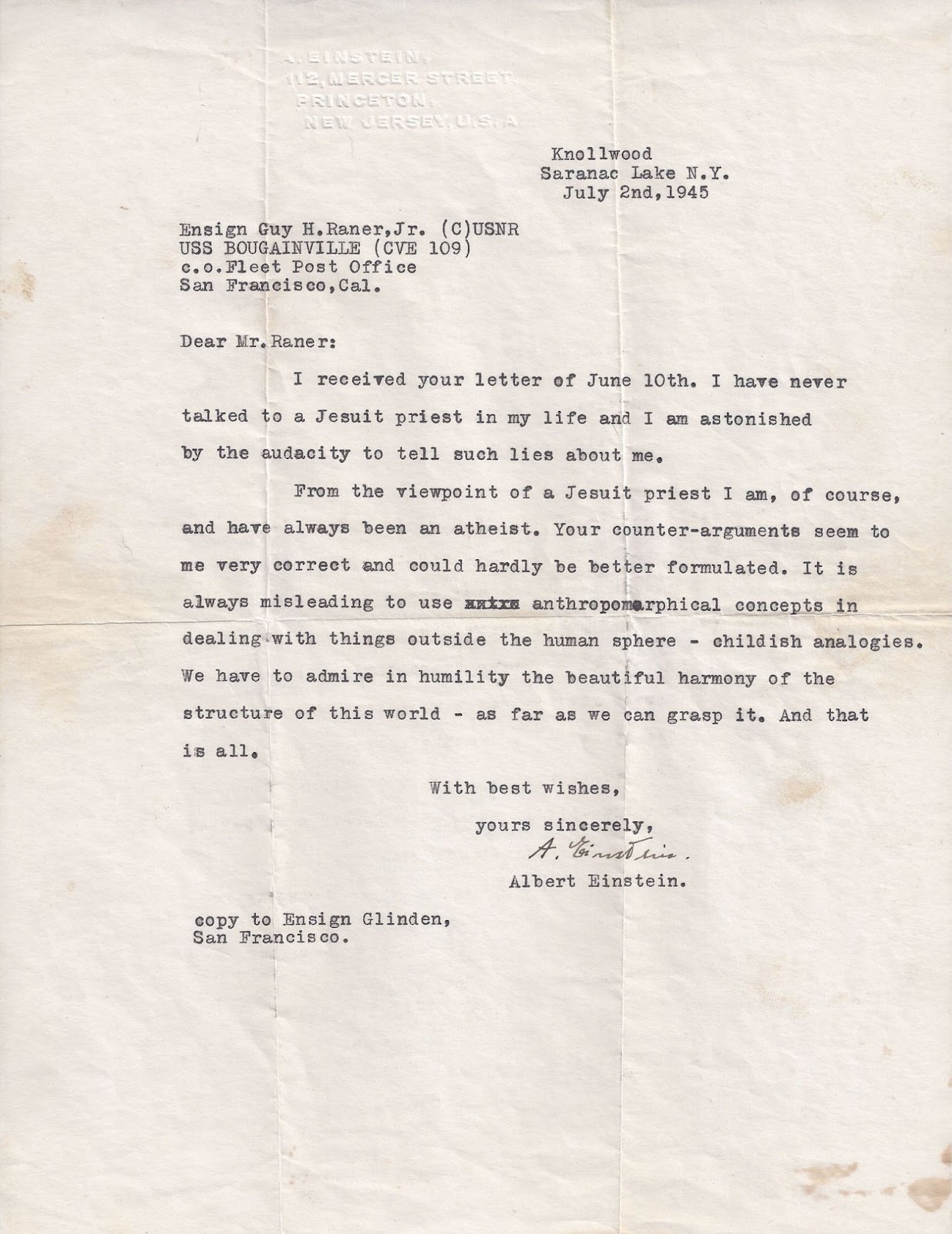
四年之後,Raner 要求愛因斯坦進一步澄清對“無神論者”的界定。Raner 提出的理由是,在耶穌會牧師眼中,很多非天主教信仰都是無神論,包括正統的猶太教或者自然神論等等都在此列,所以如果愛因斯坦僅僅以“無神論者”自居,有可能表示他依然信仰一個人格化的神。另外,Raner 也要求愛因斯坦授權他可以使用愛因斯坦的書信作為證據來與其戰友爭論。
愛因斯坦在回復中再次強調具有人格的神乃是一個幼稚的觀念:
I have repeatedly said that in my opinion the idea of a personal God is childlike. You may call me an agnostic, but I do not share the crusading spirit of the professional atheist ……
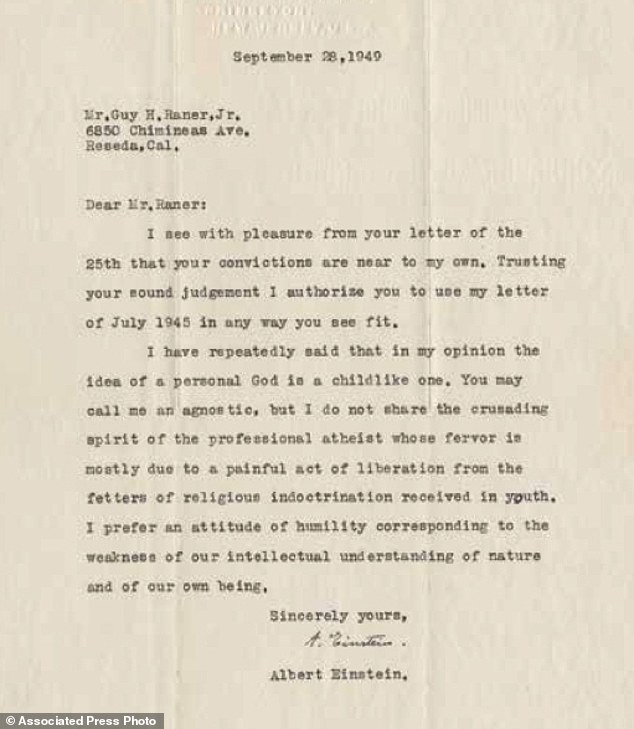
愛因斯坦在此信中又重申了他對於人格化的上帝的看法:幼稚(chuldlike),比較一下他之前的上帝之書,以及《紐約時報》上的文章,他的這個觀點是前後一致的。另外,從關於耶穌會牧師的討論中,也可以推斷得出,在愛因斯坦生前,他的世界觀就已經在被誤解和誤傳了。
對猶太教拉比的回應
在 1947 年,一個來自紐約布魯克林區的猶太人 Murray W. Gross 致信給愛因斯坦,詢問他對於上帝和宗教的態度,Gross 當時是代表他的爺爺詢問這個問題,因為他的爺爺是一個猶太教拉比,同時也是一位研究《塔木德》(Talmud,是猶太教內重要性僅次於《塔納赫》的宗教文獻)的學者。同年 4 月 26 號,愛因斯坦以英文回信 Gross,其回復包含如下內容:
It seems to me that the idea of a personal God is an anthropomorphic concept which I cannot take seriously. I feel also not able to imagine some will or goal outside the human sphere. My views are near to those of Spinoza: admiration for the beauty of and belief in the logical simplicity of the order and harmony which we can grasp humbly and only imperfectly. I believe that we have to content ourselves with our imperfect knowledge and understanding and treat values and moral obligations as a purely human problem—the most important of all human problems.
從這一段書信內容之中可以明確地看到,愛因斯坦拒絕接受一個具有人格的(personal)和擬人化的(anthropomorphic)神,亞伯拉罕諸教裡的上帝便屬於這一概念,另外還有北歐神話、古希臘神話和印度教裡的諸多神祗。而且他也指出了,道德是一個純粹的人文問題,不需要藉助於神這個概念來解決,他所表達的這個立場有一個宗教文化背景,在最近兩個世紀以來,隨著科學的發展,基督教的世界觀與近代科學的發現越來越無法兼容,所以到了近代,基督徒為自己辯護的主要策略是強調上帝的存在為人類提供了道德依據,《聖經》則提供了道德規則與典範。
另外值得一提的是,愛因斯坦在這裡也再次指出了他自己的世界觀接近斯賓諾莎。
這封書信的內容被收錄在以下兩本關於愛因斯坦的傳記中。
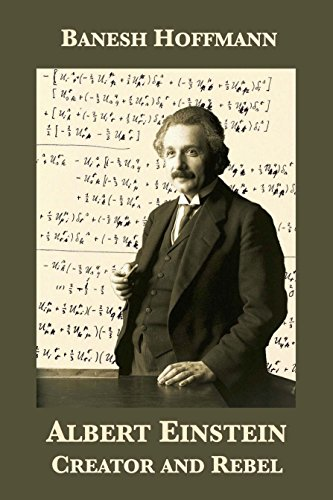
《Albert Einstein: Creator and Rebel》,1972 年出版,由 Banesh Hoffmann 主稿,Helen Dukas 作為聯合作者 。
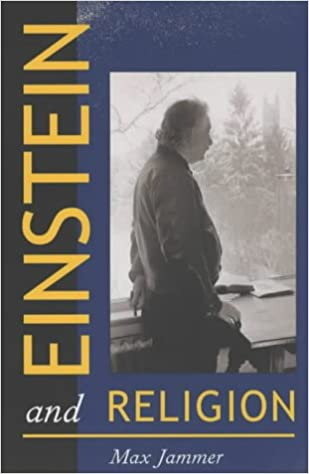
《Einstein and Religion: Physics and Theology》,Max Jammer 著,1995 年由 Princeton University Press 出版社出版。
自傳
不僅如此,1949 年,在一份名為《The Saturday Review》的雜誌上(1949 年 11 月 26 號刊),愛因斯坦以《Notes for an Autobiography》為題,發表了一篇描述他的世界觀的文章,其中首先便解釋了他對於猶太-基督教的態度。其內容是:
Thus I came — despite the fact that I was the son of entirely irreligious (Jewish) parents — to a deep religiosity, which, however, found an abrupt ending at the age of twelve. Through the reading of popular scientific books I soon reached the conviction that much in the stories of the Bible could not be true. The consequence was a positively fanatic orgy of freethinking coupled with the impression that youth is intentionally being deceived by the state through lies; it was a crushing impression.
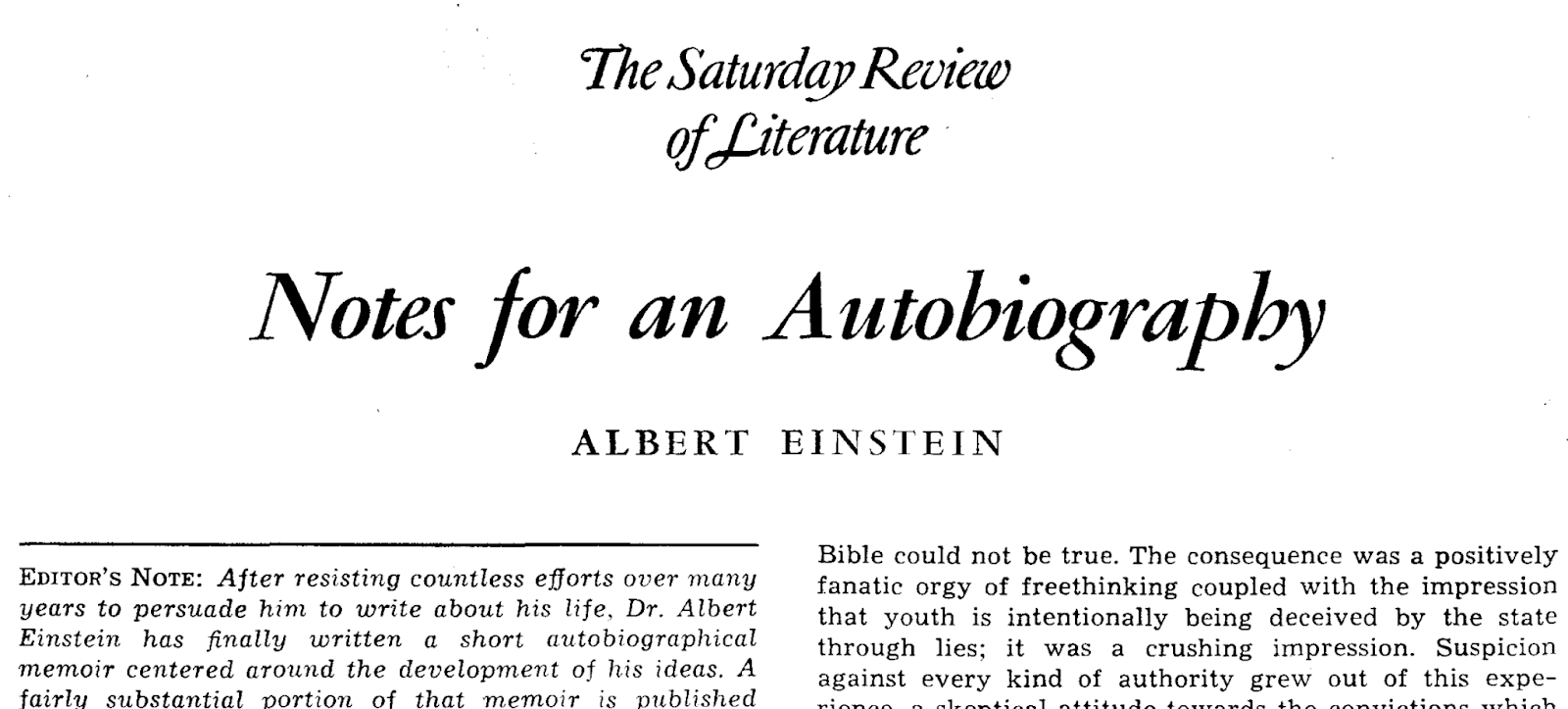
其中明確表明了他不相信《聖經》中的多數內容。後來這篇文章與其他文章一起被收錄在《Autobiographical Notes》一書中。
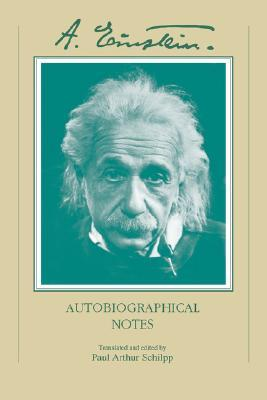
對無神論者的回應
1954 年 3 月 22 日,一位意大利移民——名叫 Joseph Dispentiere——致信給愛因斯坦,他在信中表明他自己是無神論者的身份,並且看到有些媒體稱愛因斯坦的信仰是傾向於傳統宗教,於是感到不滿,致函求證。愛因斯坦在 24 號的回復包括如下內容:
It was, of course, a lie what you read about my religious convictions, a lie which is being systematically repeated. I do not believe in a personal God and I have never denied this but have expressed it clearly. If something is in me which can be called religious then it is the unbounded admiration for the structure of the world so far as our science can reveal it.
這段回復中,從愛因斯坦的口吻可以看出,就連他自己也意識到了自己在這個問題上的觀點往往被誤解,而他也強調他已經清晰地表達過自己的看法。
回顧了以上文章及書信之後,我們可以看得出,愛因斯坦對於宗教的觀點始終是一致的,從他年輕時代一直到晚年,沒有過改變,(之所以強調這一點,是因為有些信徒也喜歡在這些細節上做手腳來誤導人)。另外愛因斯坦對於一神論宗教的看法,他自己也向來解釋的很清楚明瞭,並不存在任何歧義性,並沒有留下做其他解讀的空間。那麼,誤解又是怎樣發生的呢?
未完待續。